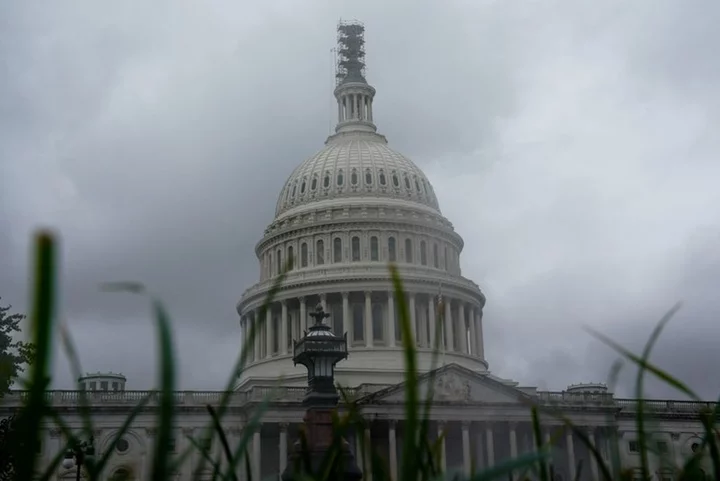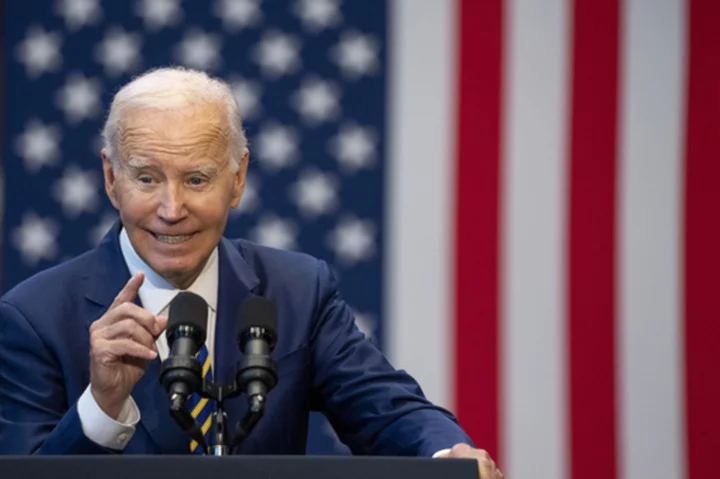By Richard Cowan
WASHINGTON The morning after U.S. House of Representatives Republicans united around new Speaker Mike Johnson, lawmakers on Thursday returned their attention to spending bills urgently needed to avert a government shutdown and respond to crises overseas.
Congress has just over three weeks until a stopgap measure to keep federal agencies funded runs out on Nov. 17, and Democratic President Joe Biden is also pushing for $106 billion in new spending to aid Israel and Ukraine, and beef up enforcement at the U.S.-Mexico border.
Meanwhile, House Republicans are pushing for a full plate of 12 separate funding bills to keep agencies running until Sept. 30, 2024, the end of the fiscal year. This rare feat requires close negotiation between the narrowly Republican-controlled House and the Senate, which has a two-vote Democratic majority.
"We are going to deliver an aggressive schedule in the days and weeks ahead," Johnson told reporters on Wednesday, shortly after he was sworn in as speaker.
Fights over money have occupied most of Congress' time for the past year. Partisan disputes brought the federal government to the brink of defaulting on its then-$31.4 trillion in debt in May, an event that would have shaken the world financial system.
Less than a month ago, intra-party fighting among Republicans brought the federal government within hours of a partial shutdown, with hardline Republicans rejecting a $1.59 trillion discretionary spending limit Biden and Johnson's predecessor Kevin McCarthy had agreed on, instead calling for an additional $120 billion in cuts.
Since then, high interest rates have pushed up the government's cost of borrowing and for the federal Social Security and Medicare programs, driving Washington to a $1.7 trillion deficit for the fiscal year ended Sept. 30.
Even the simplest steps - like arriving at the duration of a short-term funding measure known as a "continuing resolution" that lawmakers agree will be needed to avoid a shutdown next month - were complicated by this month's vacant speakership.
"It's something we have to negotiate with the House and that's difficult at the moment," Republican Senator John Kennedy, a member of the Senate Appropriations Committee, noted the day before Johnson's election.
SENATE PROGRESS
The Senate, following long delays imposed by a few Republicans, is moving ahead with three of its 12 bipartisan funding bills. By next week it hopes to pass appropriations for farm programs, transportation and housing and veterans.
Senate Majority Leader Chuck Schumer wants to then pivot to considering the aid money for Israel, Ukraine and Taiwan - and the stop-gap funding.
But the fiscal warfare between the Senate and conservative House Republicans that has raged since January is unlikely to end soon.
"Bipartisanship will be essential for keeping the government open in less than a month and bipartisanship will be essential for passing the president's national security request," Schumer said in a Senate speech.
Significant changes by Congress to Biden's request for aid to Ukraine and more money for border security were anticipated.
Republican Representative Tom Cole, a powerful lawmaker who heads the gatekeeping committee for House legislation, said that "wedge" issues - partisan priorities - would slow the emergency spending package the White House is seeking.
"We need to be able to respond quickly and decisively in the kind of times we live in right now," Cole said. Asked what his advice to Johnson would be, he added, "don't overplay your hand."
Congressional Hispanic Caucus Chair Nanette Diaz Barragan said in an interview that she does not believe money targeted to cities is enough to provide shelter and other services for immigrants being transported from the southwest border with Mexico to northern destinations.
Republicans attack Biden's border security spending, saying it falls far short in shutting down illegal border crossings and the flow of drugs such as fentanyl.
And far-right conservatives could demand deep cuts in the stop-gap bill, instead of simply extending current spending levels.
Senate appropriators from the two parties had varying expectations.
Democratic Senator Joe Manchin stressed the need for beefed-up border security.
"It's the only way you can go home and explain to people" also voting for aid to Ukraine and Israel, said Manchin, who is mulling whether to run for re-election in West Virginia, which is now heavily Republican.
Senator Kennedy, who serves on the Senate Appropriations Committee with Manchin, was upbeat, saying quick progress on more of those 12 bills was possible in coming weeks.
(Reporting by Richard Cowan; Editing by Scott Malone and Richard Chang)









